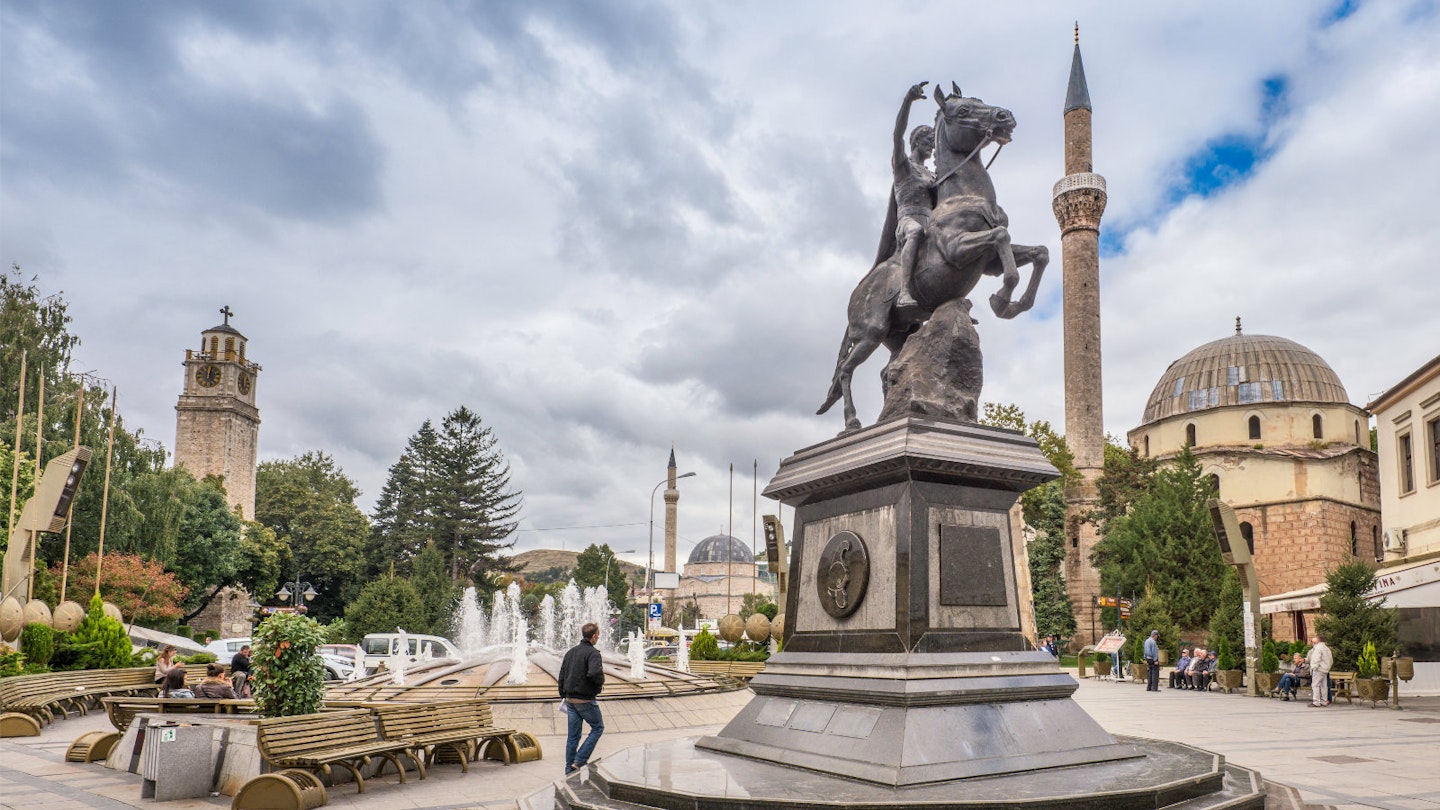
With visitors to North Macedonia typically flocking to Lake Ohrid and the capital Skopje, Bitola patiently awaits its moment to shine. This enchanting city offers curious travellers significant historical sites alongside a charming cafe culture. Additionally, it features a celebrated international film festival, growing local wine production, and superb hiking opportunities nearby. Consequently, Bitola deserves a place on any North Macedonia itinerary.

A Stroll Through History
Bitola’s architectural grace reflects its historical significance as the diplomatic and cultural hub of the Ottoman Empire in the Balkans. This legacy earned it the nickname ‘city of consuls,’ as 19th-century European influences are visible in the neoclassical-style townhouses erected by the local aristocracy.
Among the prominent Ottoman-era structures are the 16th-century Yeni, Isak, and Yahdar-Kadi mosques, alongside the grand Saat Kula (Clock Tower). The vibrant Stara Čaršija (Old Bazaar) once thrived as a key trading center in the Balkans, once housing over a thousand craft shops. Although fewer than a hundred merchants remain, wandering the cobblestone streets offers a delightful time-travel experience and a chance to find unique bargains and genuine souvenirs.

Visitors should not miss the Museum of Bitola, situated in the old Bitola Barracks (established in 1848), which formerly hosted the Ottoman military academy. The academy’s most famous graduate, Mustafa Kemal Atatürk, is commemorated through various official documents and photographs in the Atatürk memorial room. Among the exhibits, a poignant love letter from a local girl adds a touch of personal history to this great leader’s life. The museum also showcases an extensive permanent exhibition detailing the region’s rich history via a variety of archaeological and ethnographic artifacts spanning the Neolithic, Hellenistic, Roman, and Byzantine periods. A noteworthy display is the beautifully preserved Bitola townhouse room from the early 20th century.
On the outskirts of the town lie the ruins of Heraclea Lyncestis, founded by Philip II of Macedon in the 4th century BC. Recognized as one of the premier archaeological sites in the Balkans, it thrived under Roman governance as a crucial stop along the Via Egnatia route, later evolving into an episcopal seat. While excavations are ongoing, visitors can explore the remnants of Roman baths and an amphitheatre, early Christian basilicas, episcopal palaces, and stunning floor mosaics adorned with symbolic animal motifs.

Wine and Cafe Culture
North Macedonia boasts a long-standing winemaking tradition, tracing back to at least the 4th century BC; fortunately, this heritage was preserved in the region’s monasteries during Turkish rule. The country’s hallmark wine is Vranec, a robust dark red variety that pairs perfectly with the national dish of tavče gravče (baked beans). Following this is the aromatic white Temjanika, which complements local fish dishes such as ohridska pastrmka (Ohrid trout). Although the premier wine region, Tikveš, can be explored on a day trip from Bitola, there is no need to arrange a winery-hopping itinerary. Local Vlatko Ružin is North Macedonia’s first-generation certified wine expert and a small-scale barrique producer. Visitors can enjoy wine tasting at his home cellar, where the dry red Cabernet Sauvignon is paired with cheese, ham, and proja (cornflour-based baked treat).
As is common across the Balkans, traditional cafe culture is integral to daily life in Bitola. The vibrant Širok Sokak (Wide Street), the town’s main pedestrian thoroughfare flanked by elegant pastel-colored facades, is the ideal setting to spend a relaxed morning or afternoon at bustling outdoor cafes, indulging in people-watching over coffee and a shot of rakija (local firewater).

Balkan Cinematography
Another of Bitola’s distinctions lies within the cinematic world. In the early 20th century, the town was the birthplace of the Manaki brothers, Milton and Yanaki, who are heralded as pioneers of filmmaking in the Balkans. The brothers achieved remarkable milestones: they established a photo studio in Bitola in 1903, introduced the first film camera to the Ottoman Empire in 1905, created the first motion pictures (a short ethnographic documentary), and later screened films in the cinema named ‘Manaki.’ Although the cinema was destroyed by fire in 1939, it is currently undergoing restoration to house a film and photo archive.
Bitola commemorates its illustrious residents annually in September when it hosts the International Cinematographers Film Festival ‘Manaki Brothers’, showcasing independent foreign films and attracting celebrities including Catherine Deneuve, Daryl Hannah, and Victoria Abril. Established in 1979, this festival is regarded as the world’s oldest dedicated primarily to the art of cinematography, with cinematographers competing for prestigious Golden, Silver, and Bronze Camera awards. The segment titled ‘See Camera,’ part of the 2016 program, aims to promote films from Southeastern Europe.

Hiking in Pelister National Park
Outdoor enthusiasts will find excellent opportunities for hiking, horse riding, or rock climbing very close to the city. The 125-sq-km Pelister National Park wraps around the town and is part of the Baba mountain range, featuring multiple peaks reaching over 2000m and pristine glacial lakes known as Pelisterski Oči (Pelister’s Eyes). Moreover, the park is a haven for endemic flora and fauna, including the rare Molika pine and Pelagonia trout, as well as resident wolves, bears, and deer.
Located just a 10-minute drive from Bitola, Villa Dihovo offers fantastic rural accommodations owned by former professional football player Pece Cvetkovski. This unique guesthouse operates on a ‘pay what you think it’s worth’ model; the only fixed prices are for homemade wine, beer, and rakija. Pece enjoys promoting the slow-food philosophy; the mushroom soup, made fresh from the family’s traditional recipes, is highly recommended. Furthermore, guests can arrange hiking, mountain biking, and additional activities through Pece, with swimming and skiing opportunities available depending on the season.
-
First published in June 2016
Brana travelled to Bitola with support from Balojani DMC. iBestTravel contributors do not accept freebies in exchange for positive coverage.




